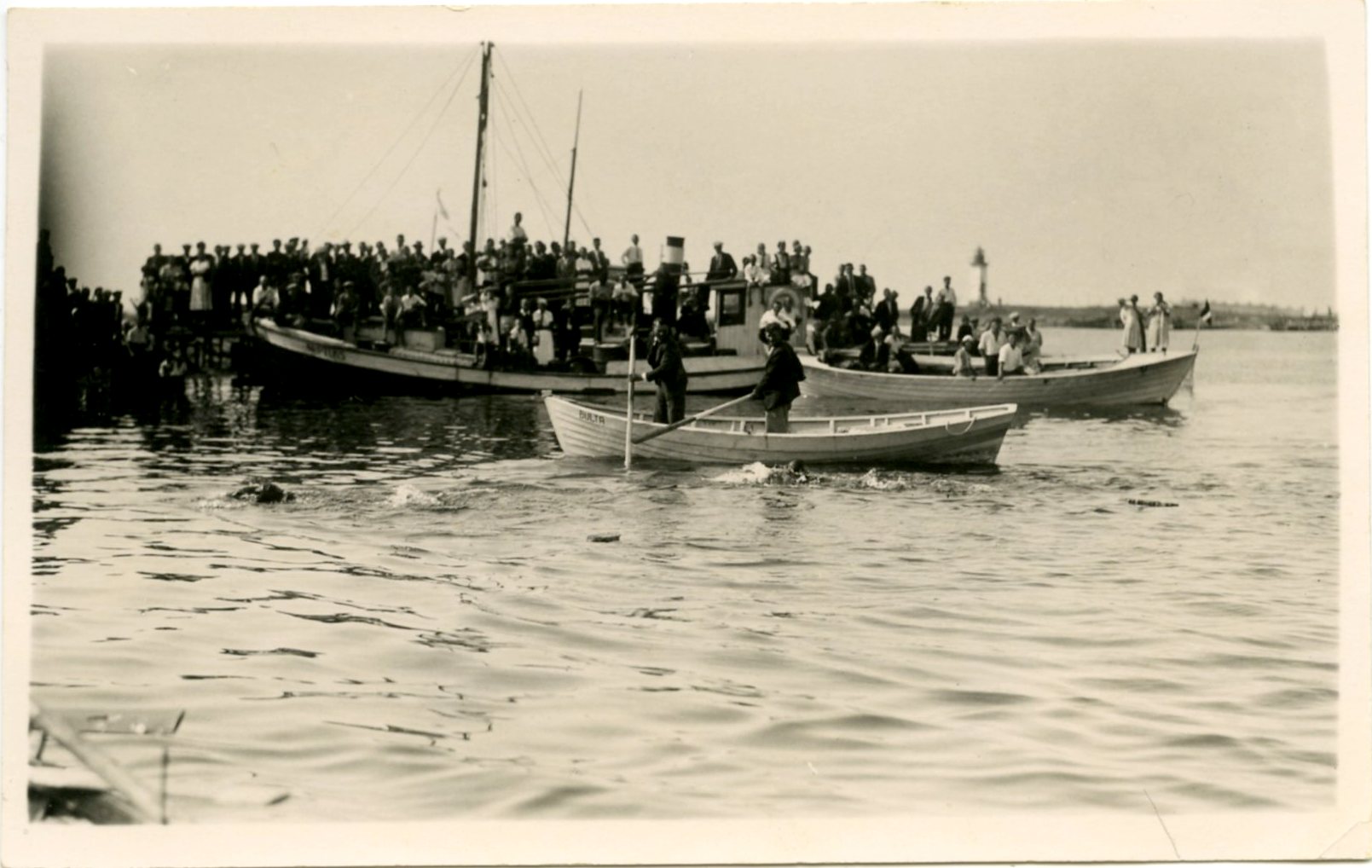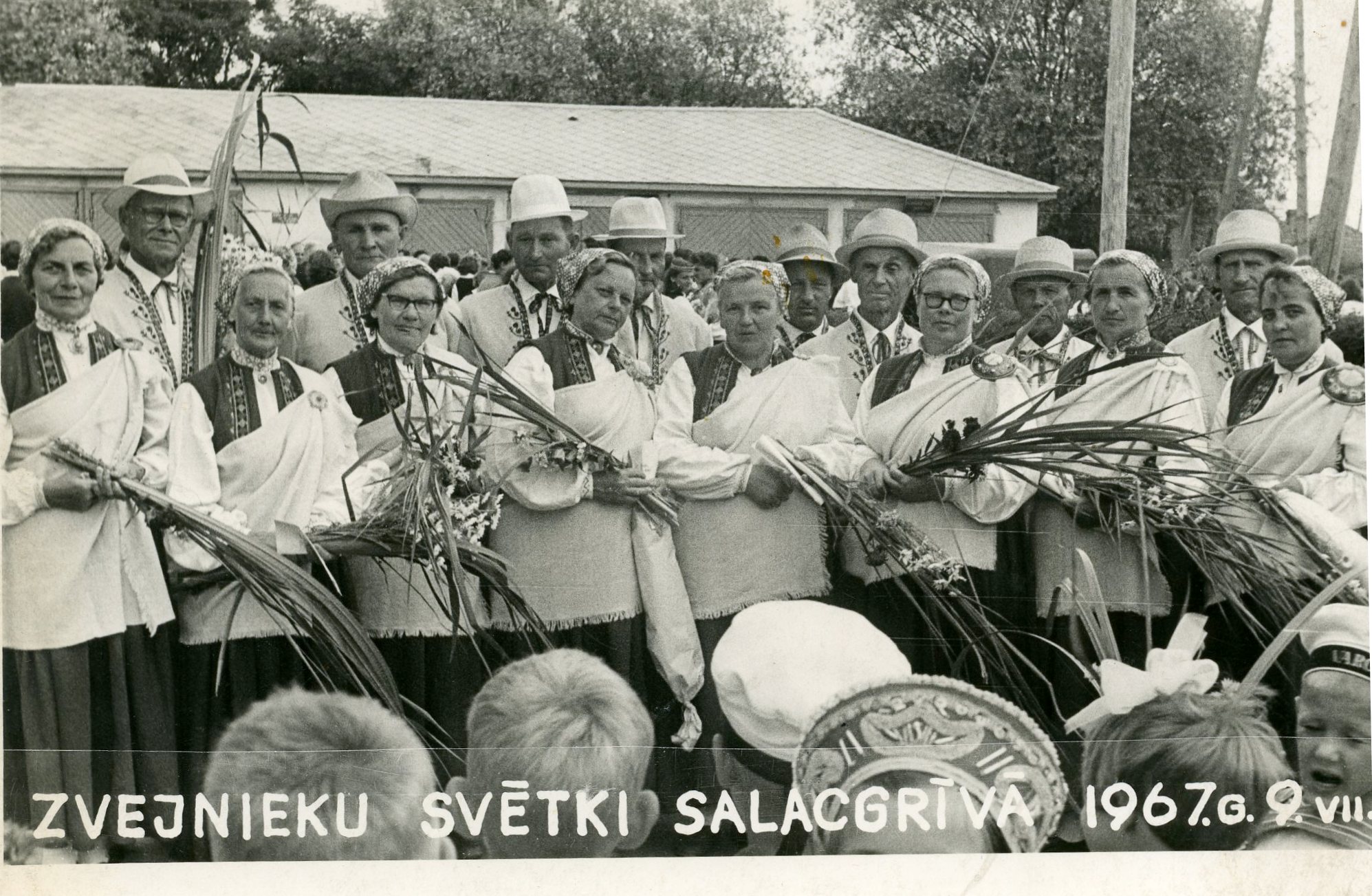













In 1939 the first Fishermen fest was organized in Salacgriva. When the war was over the Fishermen fest tradition was renewed but the ambitious celebration in Salacgriva began in 1967 when the fishermen kolkhoz Brivais vilnis built a new stage in Zvajnieku Park.
A newspaper commented on the first Fishermen fest event in 1939:
The Limbazu Vestnesis August 25, 1939:
A great festival was in Salacgriva last Sunday. The community of Ainazi-Salacgriva fishermen organized the first united Fishermen fest. Many cars that brought the first visitors entered the town decorated with the State flags early in the morning. The new guests from the nearby and remote fishermen villages continued to arrive until the beginning of the fest. The first ever Fishermen fest began with the fishermen boat parade. The boats decorated with flowers formed a continuous line that stretched for many kilometres from the seashore forming a rank to arrive all together at the place of the commencement of the fest – the estuary of the Salaca. Ludvigs – the Head of the Fishery Department of the Ministry of Agriculture as well as Mr. Cirulis – the representative of the Central Union Zvejnieks, who both arrived to congratulate the enthusiastic fishermen of Salacgriva nad the surrounding, opened the fest with a speech. Amongst the guests we can see Janis Liepins, the reeve; the director of Kengarags; the representatives of the surrounding fishermen; the guests from the remote districts: Sloka, Limbazi and other fishermen communities. The fest provided different kinds of entertainment such as: race of the fishermen boats, swimming in competition fishermen costumes, darning of fishermen nets, aptitude and paddling. Several thousand spectators watched with interest the progress of the race. The banks of the Salaca had not experienced such a large influx of people for a long time, as it had these holidays.
The jury worked in cooperation with the public management in the leadership of Kurpnieks. The technical aspect of the racing was supervised by Shtelcs.
Unusual competitions were full of agility when the net was darned and the spectators especially liked the swimmers and fishing outfits. The occupation of a fisherman is full dangers and unexpected adventures; they must be ready for the rough sea and for the encounter of death face to face.
The men that hardened in the hard work, rough sea, wind and waves organized a really marvellous parade that revealed a small part of the work that is performed every day by the scattered along the coast of Latvia fishermen villages.
After the fast races the fishermen and their countless guests gathered in the Corporate event house in Salacgriva at the already laid table. Here the work of fishermen was honoured by the priest of the orthodox parish – Laucis, the priest of the Lielsalacas Lutheran parish Migla, the reeve of Salacgriva town – Liepins, the representatives of the Ministry of Agriculture and still others. During the luncheon the public manager Kurpnieks expressed his gratitude on behalf of the fishermen community to the government and the President of the country for the work to improve the living and working conditions of the fishermen. At the end of the speech, there was endless praise of the government and the President that was expressed by the participants. During the festivity, several patriotic songs were sung as well as a male double quartet Tevija, which arrived to the Fishermen fest with the assistance of the Public Affair Ministry. In the evening, in the Melnalksnu Park, there was the award ceremony where the prizes that had been gained were given to the winners. The Ministry of Agriculture, the Fishermen Community, the Municipality of the Salacgriva town and the patrons of the fishermen provided the prizes for the most successive fishermen. After the prizes had been given to their winners the male double quartet Tevija sang several popular songs. The listeners were so touched by the singing that almost all songs had to be repeated and even more songs had to be sung. The singers were dressed in white folk costumes that had been ethnically correctly sewn. The costumes were bought and then presented to the double quartet by the President. The songs about bravery and the national folk costumes were a wonderful closing to the first Fishermen fest. The prolonged applause of the listeners did not die out for a long time, however, some of the visitors felt rather frustrated as the clowns from Riga that had promised to come and announced about their arrival in the advertisement did not come to the fest.
The first Fishermen fest did succeed and even if there were some hiccups in the arrangement then the mistakes just have to be taken into account for the future. We should hope that on many years to come the fishermen work and organisation will be ever better and fuller.